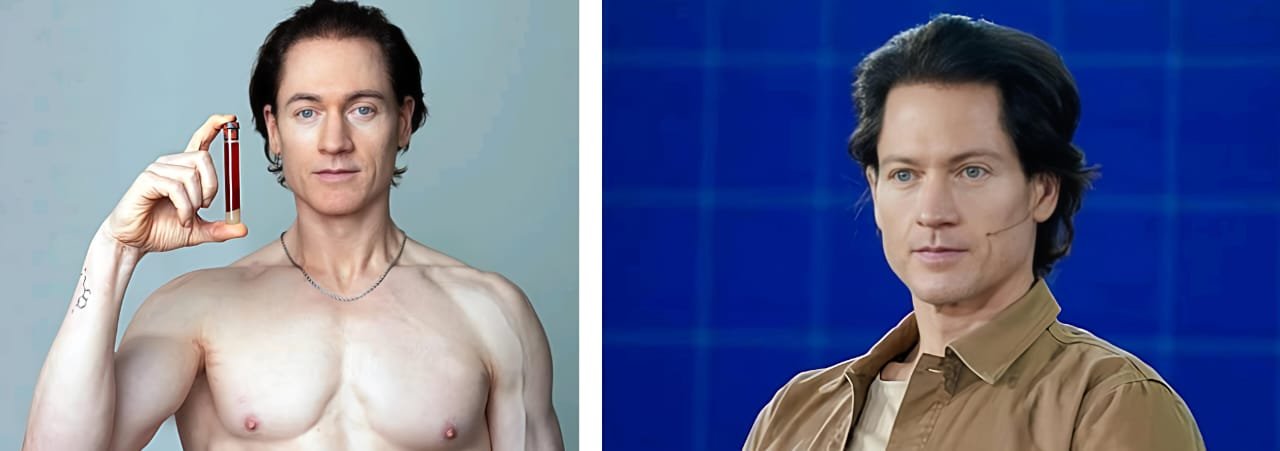“‘I Don’t Want It Anymore!’ — Bryan Johnson Abandons ₹17-Crore-A-Year Anti-Aging Empire to Preach New Religion: ‘Don’t Die’”
In a bombshell revelation that’s shaking both biotech boardrooms and the halls of philosophical thought, 47-year-old tech millionaire and longevity crusader Bryan Johnson has declared war on his own empire. The man who spent ₹17 crore ($2 million) a year to turn back time, now wants nothing to do with the very company that made him a global poster boy for anti-aging.
“I don’t need the money, and it’s a pain-in-the-a** company,” Johnson told Wired in a brutally honest interview. With those few words, he signaled the possible end of Blueprint, his much-hyped wellness startup, and perhaps the beginning of a much stranger, more radical path — one paved not with supplements and lab tests, but with a belief system he’s calling a religion.
From Tech Titan to Immortality Seeker!
Bryan Johnson first captured public attention not as a mystic, but as a data-obsessed biohacker. Through his ambitious Project Blueprint, Johnson became a self-made experiment — submitting himself to hundreds of medical tests, consuming dozens of pills daily, and following an ultra-regimented lifestyle in a bid to biologically reverse aging.
His claim? He had reduced his body’s biological age significantly, boasting the heart of a 37-year-old, the skin of a 28-year-old, and the lungs of a teenager — all while being nearly 50.
And it came at a cost: over ₹17 crore annually. His company Blueprint was built to monetize his discoveries — offering pricey health supplements, like a ₹4,700 “longevity mix” and a ₹3,600 mushroom coffee alternative dubbed Super Shrooms. The brand quickly became a sensation among elite wellness circles.
But behind the polished YouTube videos and Instagram updates was a man slowly growing disillusioned with what he had built.
‘It’s Not Worth It to Me Anymore’!
In the same candid interview, Johnson peeled back the curtain on his internal conflict. “I started this company because people wanted what I was doing for myself. I thought I could help. But now it’s evolved in a direction where I feel like I’m being misunderstood,” he confessed.
And then came the turning point — religion.!
In March, Johnson unveiled on X (formerly Twitter) what many initially assumed was a joke: a new religion named “Don’t Die.” It wasn’t satire. It was a manifesto — a declaration that humanity’s ultimate moral responsibility is to defeat death.
What sounded like science fiction soon gathered traction. Johnson began preaching not products, but purpose. “Death is optional,” he declared. “If we can cure aging, why shouldn’t we?” He began holding virtual sermons, encouraging people to view longevity not just as a science project, but as a sacred obligation.
But his business was dragging him back into the capitalist swamp he now wanted to escape.
“People look at the company and then they doubt my philosophical commitment,” he said. “I won’t make that trade-off. It’s not worth it to me. So yeah, I don’t want it anymore.”
A Business Empire in Limbo!
While Johnson floats between transcendence and total burnout, his company remains in limbo. Sources close to the entrepreneur say he’s been in talks with several buyers — possibly even large pharmaceutical firms — but no deal has been finalized.
Industry experts are split on what this means.!
“He was the Elon Musk of aging — bold, controversial, boundary-pushing,” says biotech analyst Elaine Turner. “If he is walking away from the anti-aging goldmine he built, it sends a signal. Either he’s evolved… or he knows something we don’t.”
Others believe it’s a classic founder burnout story with a mystical twist. “He over-optimized his body — maybe he undernourished his soul,” one wellness consultant quipped anonymously.
Still, thousands of loyal Blueprint customers now wonder what will happen to the products, the protocols, and the promise.
What Comes Next: Immortality or Obscurity?
If Johnson does sell or shut down Blueprint, he won’t be disappearing. In fact, he may become more visible — not as an entrepreneur, but as a prophet of Don’t Die.
He plans to expand his new religion into a global movement, complete with guidelines, rituals, and — possibly — temples. He envisions a future where people live centuries, maybe forever, all through technological and biological advancements fused with spiritual commitment.
“The biggest lie we’ve ever believed,” he says, “is that we’re supposed to die.”
Some call him a genius. Others call him a cult leader in the making. But everyone agrees on one thing: Bryan Johnson never does things halfway.
Final Words!
In a world obsessed with youth, Bryan Johnson once offered the roadmap. Now, he’s tearing it up, choosing meaning over money, belief over business.
In the end, perhaps the most shocking thing isn’t that he’s trying to live forever — it’s that he’s willing to give everything up for the chance to try.
“I don’t want the company. I want the truth. I want life — real, infinite, unbreakable life.”
Whether that makes him a visionary or a madman… time will tell.















